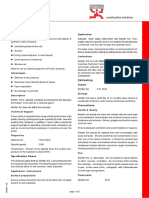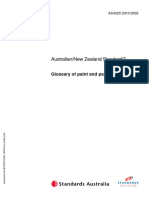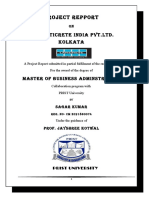0 ratings0% found this document useful (0 votes)
22 viewsCs Morning Wood
Cs Morning Wood
Uploaded by
Jed CartabioThis document provides information on various products used in aircraft wood structures, including:
- Nitrate dope thinner which prepares surfaces for painting and speeds drying time.
- Butyrate dope thinner which is used to reduce viscosity of butyrate products and retains ability to shrink over time.
- Retarder which slows evaporation for warm humid areas to reduce blushing.
- Anti-blush thinner which is a blend of solvents mixed with lacquers to avoid blushing.
- Enamel reducer which adjusts paint consistency for spraying and evaporates to allow paint to set.
- Rejuvenator which uses plasticizers to soften old coat
Copyright:
© All Rights Reserved
Available Formats
Download as PDF, TXT or read online from Scribd
Cs Morning Wood
Cs Morning Wood
Uploaded by
Jed Cartabio0 ratings0% found this document useful (0 votes)
22 views22 pagesThis document provides information on various products used in aircraft wood structures, including:
- Nitrate dope thinner which prepares surfaces for painting and speeds drying time.
- Butyrate dope thinner which is used to reduce viscosity of butyrate products and retains ability to shrink over time.
- Retarder which slows evaporation for warm humid areas to reduce blushing.
- Anti-blush thinner which is a blend of solvents mixed with lacquers to avoid blushing.
- Enamel reducer which adjusts paint consistency for spraying and evaporates to allow paint to set.
- Rejuvenator which uses plasticizers to soften old coat
Copyright
© © All Rights Reserved
Available Formats
PDF, TXT or read online from Scribd
Share this document
Did you find this document useful?
Is this content inappropriate?
This document provides information on various products used in aircraft wood structures, including:
- Nitrate dope thinner which prepares surfaces for painting and speeds drying time.
- Butyrate dope thinner which is used to reduce viscosity of butyrate products and retains ability to shrink over time.
- Retarder which slows evaporation for warm humid areas to reduce blushing.
- Anti-blush thinner which is a blend of solvents mixed with lacquers to avoid blushing.
- Enamel reducer which adjusts paint consistency for spraying and evaporates to allow paint to set.
- Rejuvenator which uses plasticizers to soften old coat
Copyright:
© All Rights Reserved
Available Formats
Download as PDF, TXT or read online from Scribd
Download as pdf or txt
0 ratings0% found this document useful (0 votes)
22 views22 pagesCs Morning Wood
Cs Morning Wood
Uploaded by
Jed CartabioThis document provides information on various products used in aircraft wood structures, including:
- Nitrate dope thinner which prepares surfaces for painting and speeds drying time.
- Butyrate dope thinner which is used to reduce viscosity of butyrate products and retains ability to shrink over time.
- Retarder which slows evaporation for warm humid areas to reduce blushing.
- Anti-blush thinner which is a blend of solvents mixed with lacquers to avoid blushing.
- Enamel reducer which adjusts paint consistency for spraying and evaporates to allow paint to set.
- Rejuvenator which uses plasticizers to soften old coat
Copyright:
© All Rights Reserved
Available Formats
Download as PDF, TXT or read online from Scribd
Download as pdf or txt
You are on page 1of 22
C's Morning
Wood
Presentation by GROUP #5
AIRCRAFT WOOD STRUCTURES
MEMBERS
CABATO, ALCANTARA, ARELLANO, FINES, JOHN GOROSPE, KIM,
ADRIAN MYRELL JED SEAN MAUI B. PAUL SEBASTIEN CHANGJUN
PRINCE P. V. GABRIELLE A.
AIRCRAFT WOOD STRUCTURES
INTRODUCTION
NITRATE DOPE THINNER ENAMEL REDUCER
REJUVENATOR
BUTYRATE DOPE THINNER
RETARDER SPOT PUTTY AND SANDING SURFACER
ANTI-BLUSH THINNER ACETONE
NITRATE DOPE
THINNER
AIRCRAFT WOOD STRUCTURES
NITRATE DOPE
THINNER
The primary purpose of nitrate dope thinner is to prepare model
surfaces for painting. Nitrate functions as a sealant for bare wood
and uncoated covering materials, and applying it to the aircraft will
speed up the drying time of the paint. Nitrocellulose (similar to
celluloid and gun cotton) is mixed with plasticizers and thinners to
make nitrate dope. Plasticizers are required to enhance flexibility
and fracture resistance once the dope has cured. Nitrate dope is
very combustible in both liquid and dry form. T124 is a British-made
nitrate/cellulose thinner that may be used with CL dopes.
BUTYRATE DOPE
THINNER
AIRCRAFT WOOD STRUCTURES
BUTYRATE
DOPE THINNER
Butyrate thinner is used to reduce the spray viscosity of all
Randolph butyrate products, tautening or non-tautening. It is
typically used in a 1:1 ratio with butyrate dopes. Butyrate dope is
made from cellulose. It will burn even though it is less flammable
than nitrate dope. It also retains the ability to shrink with age.
This shrinkage must be considered in order to avoid damage to
underlying structures over time. Nitrate dope is only used for the
first coats of Ceconite; butyrate is utilized for all subsequent
coats. Clear butyrate is used as a build coat to provide the dope
film thickness and body while remaining flexible. Clear Butyrate
has a transparent tan tint to help you see the product as you
apply it.
RETARDER
AIRCRAFT WOOD STRUCTURES
RETARDER
Slower evaporation solvent for use in
warm and humid areas. Reduces blush
ANTI-BLUSH
THINNER
AIRCRAFT WOOD STRUCTURES
ANTI-BLUSH
THINNER
A clear colourless unique blend of
solvents, mixed with lacquers and varnish
to avoid/reduce blushing.
ENAMEL
REDUCER
AIRCRAFT WOOD STRUCTURES
ENAMEL
REDUCER
Acrylic Enamel Reducer aids in blending and spot panel
repairs. Use standard or acrylic enamel. Produces a dazzling
shine and excellent leveling. The reducer adjusts the
consistency of the paint to make it easier to spray on the
automobile surface. After that, the reducer evaporates,
enabling the paint to set and solidify. The basic aim of
reducers is to make the paint thin enough to spray via a gun
while also providing leveling and adherence. They are
composed of a mixture or blend of several solvents. The mixes
vary according to the circumstances and temperature.
REJUVENATOR
AIRCRAFT WOOD STRUCTURES
REJUVENATOR
A rejunevator has a custom mix of the same plasticizers used in
Poly-Fiber coatings in the right amounts, along with
penetrating solvents to carry the plasticizers into the old
coating and bring back the original flexibility. One example of
applying rejuvenator is spray on a coat of rejuvenator to soften
the aluminum dope if a fabric work has been interrupted during
the finishing process and the fabric has been exposed to it for a
long period before the topcoats are applied. Then, spray on the
color coats. strength.
In rejuvenating an aircraft fabric,
Rejuvenating dope does not provide a
permanent solution for cracked finishes.
However, the procedure will result in a long-
lasting finish for a few years without
requiring thorough recovery of the aircraft.
Remember, before beginning the renewing
procedure, you must make sure the cloth
beneath the damaged surface is sound.
Rejuvenating should not be tried if the area
in issue exhibits evidence of fabric
deterioration from exposure to the sun, etc.
It's time to recover the airplane if the fabric
has lost its tensile
SPOT PUTTY &
SANDING SURFACER
AIRCRAFT WOOD STRUCTURES
SPOT PUTTY
Can also be referred to as wood putty.
It is to fill imperfections in our wood
structure such as holes and the unwanted
cracks done by excessive work and force
applied onto our wood structure.
When using spot putty, be certain that any
defects that may cause a loss of structural
strength are not covered up and hidden.
SANDING
SURFACER
This type of substance is used to fill and
cover any surface imperfection in the wood.
high solid epoxy surfacer intended for use on
aircraft and other aerospace applications
over Sherwin-Williams corrosion protective
primers. It is used to fill and cover surface
imperfections to create a smooth surface for
topcoat application.
ACETONE
AIRCRAFT WOOD STRUCTURES
ACETONE
Acetone is an excellent solvent because it can dissolve polar and
nonpolar compounds, whereas other solvents can only dissolve
one or the other. Acetone can be used on both organic and
inorganic materials. Acetone is a popular solvent used to
produce plastics and other industrial goods. It is commonly used
in the woodworking industry to remove old paint or varnish
remains from hardwood furniture so that a new coat may be
applied smoothly. Acetone is a widely used cleaning solvent. It is
used to clean up after painting and to remove lacquer coatings.
Acrylics or lacquers that have hardened in spray guns or hoses
will be softened.
THANK YOU FOR
LISTENING
You might also like
- Aircraft Painting and FinishingDocument29 pagesAircraft Painting and FinishingJohan Louie Rayos80% (5)
- Painting and Protection of VehicleDocument44 pagesPainting and Protection of Vehiclenahom100% (6)
- Exterior Finishes FinalDocument14 pagesExterior Finishes FinalAshish Marwha0% (1)
- Description Technical Data: BOYSEN® Quick Drying EnamelDocument2 pagesDescription Technical Data: BOYSEN® Quick Drying EnamelJM Arcilla100% (1)
- Color Mixing GuideDocument9 pagesColor Mixing GuideAnalynDelaCruz-Lazaro100% (3)
- PAINTING... Solving The Mystery: by Ron AlexanderDocument4 pagesPAINTING... Solving The Mystery: by Ron AlexanderJessie BechaydaNo ratings yet
- The Paint System: Primer Intermediate CoatsDocument5 pagesThe Paint System: Primer Intermediate CoatsJerome ChuaNo ratings yet
- Paints and VarnishesDocument58 pagesPaints and VarnishesMia ListaNo ratings yet
- PRIMAL™ AC-337ER Highly Versatile Pure Acrylic EmulsionDocument11 pagesPRIMAL™ AC-337ER Highly Versatile Pure Acrylic EmulsionXuxo XuxitoNo ratings yet
- Paints Final Assignment 6th NovDocument8 pagesPaints Final Assignment 6th NovGlobal PMCNo ratings yet
- Aeronautical PaintsDocument35 pagesAeronautical PaintsScribdTranslationsNo ratings yet
- Technical Technical Technical Technical Bulletin Bulletin Bulletin BulletinDocument9 pagesTechnical Technical Technical Technical Bulletin Bulletin Bulletin Bulletinprem prakash mishraNo ratings yet
- Maintenance and Repair ManualDocument5 pagesMaintenance and Repair ManualRais IsanNo ratings yet
- Pintar AvionDocument7 pagesPintar AvionJohn AlajoNo ratings yet
- What Is A Paint PrimerDocument5 pagesWhat Is A Paint PrimerJaspreet singh nagpalNo ratings yet
- Amte 115Document8 pagesAmte 115Bo BoNo ratings yet
- Antifouling 2Document2 pagesAntifouling 2gulsumNo ratings yet
- Acrylic Binders For Low Voc PaintsDocument31 pagesAcrylic Binders For Low Voc PaintsMaina1206567% (3)
- Protection From Corrosion by Organic CoatingDocument19 pagesProtection From Corrosion by Organic CoatingKh Aasim BashirNo ratings yet
- Maintenance and Repair ManualDocument4 pagesMaintenance and Repair Manualgillang1No ratings yet
- Parquet Flooring BrochureDocument8 pagesParquet Flooring Brochuresamuelervin92No ratings yet
- 17rubbercompoundingpptkiran 150318135628 Conversion Gate01Document16 pages17rubbercompoundingpptkiran 150318135628 Conversion Gate01Madan Saini100% (2)
- AD3373 RM Product Guide 0911Document20 pagesAD3373 RM Product Guide 0911GEOVANNY LinaresNo ratings yet
- ADD-002 Lubrizol Additives BrochureDocument8 pagesADD-002 Lubrizol Additives BrochureVictor Lopez100% (2)
- Technology Liquid Coating Resins Liquid Coating Resins Product Range Emea EnglishDocument8 pagesTechnology Liquid Coating Resins Liquid Coating Resins Product Range Emea EnglishUsama AwadNo ratings yet
- Painting 1-4Document9 pagesPainting 1-4Johan Louie RayosNo ratings yet
- Zero Paints Colour Application Guide PDFDocument1 pageZero Paints Colour Application Guide PDFRonald E. BarbozaNo ratings yet
- EDM - 012 Additives For Wood and Furniture Coatings PDFDocument8 pagesEDM - 012 Additives For Wood and Furniture Coatings PDFEugene PaiNo ratings yet
- 926 02012 01 Primal Ac 337 Ds Emulsion TdsDocument9 pages926 02012 01 Primal Ac 337 Ds Emulsion Tdskingkb58100% (1)
- 13 Timber Preparation & FinishesDocument14 pages13 Timber Preparation & Finishesmlatifi2025No ratings yet
- Dow SurfactantsDocument12 pagesDow Surfactantsv100% (1)
- CPD PrimerssealersandundercoatsDocument22 pagesCPD PrimerssealersandundercoatsNatasha DavisNo ratings yet
- CETG 121 - FinishesDocument58 pagesCETG 121 - Finishesjmapogo09No ratings yet
- Engineering Materials & CatalysisDocument33 pagesEngineering Materials & CatalysisNilam ThoratNo ratings yet
- Set Your Goal, Plan Your Strategy and Study ConsistentlyDocument22 pagesSet Your Goal, Plan Your Strategy and Study ConsistentlyShee JaNo ratings yet
- Bidding Documents and Invitation To Bid Part 4Document40 pagesBidding Documents and Invitation To Bid Part 4Grace Mecate VillanuevaNo ratings yet
- (IS 101/1987, Part 1, Sec 6) : Exterior - Aesthetics Issued - 01 2017Document2 pages(IS 101/1987, Part 1, Sec 6) : Exterior - Aesthetics Issued - 01 2017Amit DhangarNo ratings yet
- Paint and VarnishesDocument61 pagesPaint and VarnishesAnkita RaniNo ratings yet
- Primal Ac337 Emulsione Acrilica 890029 TdsDocument18 pagesPrimal Ac337 Emulsione Acrilica 890029 TdsForeverNo ratings yet
- Nail or Catalog Air Distribution CombinedDocument842 pagesNail or Catalog Air Distribution CombinedDavid RivardNo ratings yet
- B Tech PAINTINGDocument8 pagesB Tech PAINTINGGabby ChebetNo ratings yet
- Catalogo IndustrialDocument90 pagesCatalogo Industriala257512No ratings yet
- Paints, Pigments, and Industrial CoatingsDocument59 pagesPaints, Pigments, and Industrial CoatingsRomar Panopio100% (4)
- Paints: Building Technology 1Document26 pagesPaints: Building Technology 1KC PanerNo ratings yet
- Satish Paint PDFDocument26 pagesSatish Paint PDFCRAZY ARCHINo ratings yet
- 300764eneu ADocument12 pages300764eneu ADanaNo ratings yet
- Permastic Vinyl Acrylic EmulsionDocument1 pagePermastic Vinyl Acrylic EmulsionCynthia MillerNo ratings yet
- CPD ClearcoatingsincludingantigraffitiDocument22 pagesCPD Clearcoatingsincludingantigraffitib3ry 17No ratings yet
- Weathering AircraftDocument10 pagesWeathering AircraftPepe Gayo100% (11)
- VRM-Brochure IN AADocument2 pagesVRM-Brochure IN AApinasthika.timurNo ratings yet
- Curing Compound SikaDocument1 pageCuring Compound Sikav2299No ratings yet
- PresentationDocument31 pagesPresentationisrailNo ratings yet
- Most Frequently Used PaintsDocument12 pagesMost Frequently Used PaintssmartcharlinNo ratings yet
- CH 8 PaintDocument10 pagesCH 8 PaintNirose ChhukanNo ratings yet
- Paints & CoatsDocument29 pagesPaints & CoatsMaitreyi YellapragadaNo ratings yet
- Lecture 1 CoatingDocument35 pagesLecture 1 Coatingzain.naqviNo ratings yet
- Interpon+D+STF IndiaDocument6 pagesInterpon+D+STF India1stchoicewindowNo ratings yet
- How to Make Outdoor & Garden Furniture: Instructions for Tables, Chairs, Planters, Trellises & More from the Experts at American WoodworkerFrom EverandHow to Make Outdoor & Garden Furniture: Instructions for Tables, Chairs, Planters, Trellises & More from the Experts at American WoodworkerRating: 5 out of 5 stars5/5 (1)
- The Carpenters, Joiners, Cabinet Makers and Gilders' Companion: Containing Rules and Instructions in the Art of Carpentry, Joinery, Cabinet Making, and Gilding - Veneering, Inlaying, Varnishing and Polishing, Dying and Staining Wood, & IvoryFrom EverandThe Carpenters, Joiners, Cabinet Makers and Gilders' Companion: Containing Rules and Instructions in the Art of Carpentry, Joinery, Cabinet Making, and Gilding - Veneering, Inlaying, Varnishing and Polishing, Dying and Staining Wood, & IvoryRating: 5 out of 5 stars5/5 (1)
- Rethinking Acrylic: Radical Solutions For Exploiting The World's Most Versatile MediumFrom EverandRethinking Acrylic: Radical Solutions For Exploiting The World's Most Versatile MediumRating: 4.5 out of 5 stars4.5/5 (3)
- DS 066 Epilux 84 ClearDocument2 pagesDS 066 Epilux 84 ClearShodhan M AminNo ratings yet
- M.SC - Surface Coating TechnologyDocument26 pagesM.SC - Surface Coating TechnologykarameltobshyNo ratings yet
- Nitoflor Sol PDFDocument2 pagesNitoflor Sol PDFBijaya Raula100% (1)
- Excel QuantityDocument234 pagesExcel Quantityviveik_mudgalNo ratings yet
- Product RPG GearpumpDocument2 pagesProduct RPG GearpumpKarun KumarNo ratings yet
- Chapter - 32 Customs Tariff Code of BangladeshDocument4 pagesChapter - 32 Customs Tariff Code of BangladeshMd. Badrul IslamNo ratings yet
- JOINLEADER 880 Weatherproof Silicone Sealant TDSDocument5 pagesJOINLEADER 880 Weatherproof Silicone Sealant TDSdasaNo ratings yet
- Solvenon PNBDocument2 pagesSolvenon PNBSarl EnasiriaNo ratings yet
- Asian PaintsDocument30 pagesAsian Paintspuneet9211No ratings yet
- Dow-Espesantes ACRYSOLES PDFDocument12 pagesDow-Espesantes ACRYSOLES PDFAntonio Benitez MendozaNo ratings yet
- Literature - AT-CURE WR200Document1 pageLiterature - AT-CURE WR200jackNo ratings yet
- Seam 1 Module 5Document46 pagesSeam 1 Module 5Rene Jan HilberoNo ratings yet
- 8 - HQ Hero - BarbarianDocument13 pages8 - HQ Hero - BarbarianAlex PlaNo ratings yet
- VOC LimitsDocument6 pagesVOC Limitslindz2004No ratings yet
- As 2310 Glassary of Paint & Painting TermsDocument41 pagesAs 2310 Glassary of Paint & Painting TermsApinya SiwawatthanawongNo ratings yet
- Annexure 1C Equivalent Paints of Diff - MakesDocument3 pagesAnnexure 1C Equivalent Paints of Diff - Makesravi00098No ratings yet
- HYCHEM Catalogue BookDocument32 pagesHYCHEM Catalogue Bookengage4u2020No ratings yet
- Cetonic Resin SH 105 SH 120 SH 120W SH 130Document3 pagesCetonic Resin SH 105 SH 120 SH 120W SH 130Professonal PainterNo ratings yet
- Gem Paints LTD.: Presented By: Piyush DhootDocument20 pagesGem Paints LTD.: Presented By: Piyush Dhootpiyush_dhoot_1No ratings yet
- Nerolac - Excel Everlast 12Document2 pagesNerolac - Excel Everlast 12Noah GarciaNo ratings yet
- Project Repport: Myk Laticrete India PVT - Ltd. KolkataDocument76 pagesProject Repport: Myk Laticrete India PVT - Ltd. KolkatamonishaNo ratings yet
- Materials and Methods in Building Construction Iii 18ARC32: Ar. Glynn George, Ar. Sri Lakshmi VDocument9 pagesMaterials and Methods in Building Construction Iii 18ARC32: Ar. Glynn George, Ar. Sri Lakshmi Vabhi shekNo ratings yet
- Auro Pursolid Hard Oil No. 123: Technical Data SheetDocument2 pagesAuro Pursolid Hard Oil No. 123: Technical Data SheetgammaburstNo ratings yet
- HPCL - Painting - Procedure ScannedDocument17 pagesHPCL - Painting - Procedure ScannedmanishkapriNo ratings yet
- TDS - Synolac S63Document2 pagesTDS - Synolac S63I Love MusicNo ratings yet
- Peb Technical SpecificationDocument4 pagesPeb Technical Specificationalankar ambwade100% (1)
- Imagery On Fabric A Complete Surface Design Handbook PDFDocument180 pagesImagery On Fabric A Complete Surface Design Handbook PDFAliceCotovioNo ratings yet
























































































